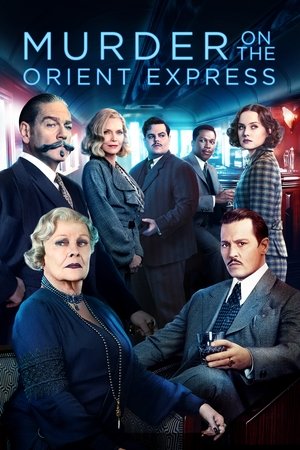
Murder on the Orient Express
**An effort worthy of merit, but which did not result in a really good work.** Kenneth Branagh is one of those actors/directors who doesn't seem to be afraid of a challenge, and I respect him for that, even if his choices aren't always the wisest. Bringing the greatest book of Agatha Christie's work to the cinema is a considerable challenge, not only given the richness of the material and characters, but also taking into account the relevance of the work and the admirers who remain faithful to the author's books (I am one of them). I can't help but say: for me, she is one of the greatest writers of the 20th century. She not only helped to cement the police narrative, but also substantively developed it. Therefore, I must absolutely condemn the recent news about the revision of her books, whose new editions will be stripped of any term, word or minimally offensive mention. In the 16th century, books were burned. Today, despite the justifications, we refine the practices, but maintain the line of thought and the similarity in attitudes towards books that can offend us. The “Orient Express” has already been adapted for the screen on several occasions. The first, in 1974, was a real show and is full of stellar actors. However, one cannot ignore the television adaptation starring David Suchet, an actor who, in a tour-de-force of many years, embodied Poirot in an impeccable way, difficult to match. The film has its merits, which are based essentially on the visuals. The cinematography makes intelligent use of light, the spectacular snowy landscapes and the vintage elegance of the train, which replicates the real Orient Express, a train that, despite numerous business mishaps, still exists. The costumes and props are also magnificent and help to recreate the era, the 1930s. A special note for the way in which the film manages to give us the perfect sensation of the smallness of the spaces. Another peaceful point is the performance of the cast. I won't be being unfair in saying that each one did a good job with the material received. Unsurprisingly, Branagh is the protagonist and gives us a Poirot that gradually becomes more human. He starts out as a weird individual, a deduction factory applied to solving crimes, and ends up with another perspective on truth and justice. That is the focal point of the book. The work of Judi Dench and Michelle Pfeiffer also deserves a special note. The others – and the film is impressive for having such a heavy cast – seem to be there just to be able to say that they worked with the director and that they were part of the project. These are all good things! However, the film is not without serious problems. The biggest and most blatant are the action scenes. Poirot is a dandy, a maniac, a genius, but he was never an action figure or a brawler. In the books, he leaves that to the police or loyal friends like Captain Hastings or Chief Inspector Japp. Seeing him in action scenes doesn't seem like something he would do. Branagh got it wrong here, just as he got it wrong with that unkempt, tasteless mustache. The books have several descriptions of Poirot's mustache and none of them fit the hair accessory used in this film, which looks more like a dead rat. The character is also stripped of most of her many obsessions, limiting itself to a craze linked to boiled eggs. It's absurd! Branagh, who did not even stop to think that he is not at all similar to the character, did not consider the shape of Poirot's head, which is described as "ovoid", and did not even try to reproduce the character's gait, which walked in small steps. And considering the elegance and refinement that characterize Poirot, the clothes Branagh wears and the almost absence of a hat are unspeakable details. The film – which focuses on Poirot – also makes a very shallow use of each character's material. Some of the ones that most dialogue with the detective in the book, like Debenham, are almost absent here. Finally, we have Johnny Depp, a casting error, turning Rachett into a kind of hateful amateur mobster.
